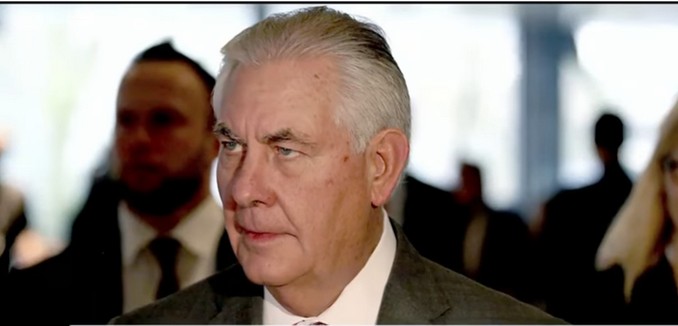The United States will withdraw from the United Nations Human Rights Council (UNHRC) unless the agency undertakes significant reforms, Secretary of State Rex Tillerson wrote in a letter to advocacy groups this week.
The letter, which was first reported by Foreign Policy, states that the Trump administration “continues to evaluate the effectiveness” of the council, especially when the group’s membership includes nations with terrible human rights records.
“We may not share a common view on this, given the makeup of the membership,” Tillerson wrote to the nonprofit organizations, who want the United States to remain in the council. “While it may be the only such organization devoted to human rights, the Human Rights Council requires considerable reform in order for us to continue to participate.”
The nine groups urging the U.S. to remain, which include Freedom House, the Committee For Human Rights in North Korea, and the Jacob Blaustein Institute for the Advancement of Human Rights, argued in an earlier letter to Tillerson that the United States could better hold rights abusers accountable and shield Israel from diplomatic attacks if it remained a member.
Then-president George W. Bush refused to join the Human Rights Council when it was formed in 2006, wary that it would have the same problems and hypocrisies as the body that it succeeded, the UN Commission on Human Rights. The Obama administration reversed that decision, believing that by joining it, the U.S. could encourage the council to reform and stop its inordinate focus on Israel.
Anne Bayefsky, president of the advocacy group Human Rights Voices, wrote in National Review last month that the UNHRC was “unfixable,” with no improvement shown since the U.S. joined:
The United States would vote against the anti-Israel resolutions, often 46 to 1, with slight variations for the times that European Union states screwed up the courage to abstain. For public consumption, Team Obama would make a nice speech about supposedly unacceptable bias against Israel at the U.N. and then turn around and spend American taxpayer dollars to implement those very resolutions.
The UNHRC voted last year to compile a database of Israeli companies operating in the West Bank, with an eye towards boycotting them. But Foreign Policy reported that the UN’s commissioner for human rights, Prince Zeid al Raad, is anxious to avoid a confrontation with the United States and has asked for a delay in compiling the database. “This is a major crisis and we don’t know how to handle it,” a UN official told Foreign Policy.
U.S. Ambassador to the UN Nikki Haley said last month that the United States would not “turn a blind eye” to anti-Israel bias at the United Nations, decrying the fact that during her first session in the Security Council, the organization’s hearing “was not about Hizballah’s illegal build-up of rockets in Lebanon. It was not about the money and weapons Iran provides to terrorists. It was not about how we defeat ISIS. It was not about how we hold Bashar al-Assad accountable for the slaughter of hundreds and thousands of civilians. No, instead, the meeting focused on criticizing Israel, the one true democracy in the Middle East.”
The UN has long been accused of having a systemic bias against the Jewish state. In 2016, the General Assembly adopted 20 resolutions against Israel and only six on the rest of the world combined, according to the monitoring group UN Watch.
In December, then-Secretary General Ban Ki-moon acknowledged his organization’s bias against Israel, saying, “Decades of political maneuvering have created a disproportionate number of resolutions, reports and committees against Israel.” Ban also criticized the UNHRC’s singular focus on Israel shortly after assuming his post in 2007, saying that he was “disappointed at the council’s decision to single out only one specific regional item, given the range and scope of allegations of human rights violations throughout the world.”
The Associated Press reported in June that Israel is the only country in the world that “has its record inspected at every single session of the United Nations Human Rights Council.” The AP added that one of the driving forces behind the UN’s focus on Israel is the influential Organization for Islamic Cooperation, which often spearheads the push for anti-Israel resolutions.
[Photo: Fox News / YouTube ]




